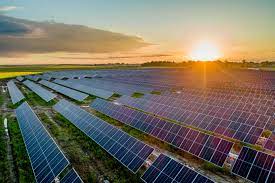By Habeeb Adamu
Nigeria has secured a $1.5 billion loan from the US-EXIM Bank to boost solar power infrastructure in 10 different locations across the country.
The loan, a government-to-government facility, comes on a concessional rate over a 20-year tenure.
Adam Cortese, CEO of SUN Africa LLC, USA, who gave the information on Thursday, said the Niger Delta Power Holding Company (NDPHC) would own the assets, which would not only generate low-cost electricity but also enable the company to pay back the loan.
“Once again, this is government-to-government financing. It’s built upon the success that we’ve had in Angola recently, where we’ve delivered roughly $2.6 billion of solar PV storage and transmission capacity,” Cortese told journalists after a meeting of the company’s delegation with President Muhammadu Buhari at the State House, Abuja.
“I think the important point to note here is, yes, it’s a government-to-government loan, from the US-EXIM Bank to the government of Nigeria, but it’s being done on a concessional rate; over 20-year tenure, which is extremely attractive,” he said.
Cortese said the unique thing about the model is that NDPHC would own its own assets.
“So, it’s going to own its own generation base and our project will deliver a low levelised cost of electricity, which will not only allow them to pay back the loan from EXIM Bank, but generate a profit on top of it,” he said.
Speaking while receiving the delegation, Buhari declared that the rapid integration of solar power into the country’s energy mix would lead to an increase in electricity access to underserved and unserved communities. He said his administration had embarked on several reforms aimed at revitalising Nigeria’s energy sector and improving energy access to communities across the country.
The president commended the interest of the US developer to invest in Nigeria’s power sector, pledging that the federal government would remain committed to collaborating with the private sector in improving energy access, creating jobs, and industrial development.
Highlighting some of the reforms embarked upon by his administration to address Nigeria’s energy need, the president listed the signing of the Nigeria Climate Change Bill in November 2021, implementation of the Power Sector Recovery Programme with the World Bank, and the Nigeria Electrification Programme aimed at enhancing energy access to remote communities.
He added that the Presidential Power Initiative with Siemens was aimed at achieving end-to-end alignment across the electricity value chain.
“Initiatives like these will go a long way in developing local capacity through technology transfer and relieving transmission constraints through the generation and distribution of electricity in the local Distribution Companies Franchise Area, making off-take easier,” Buhari said.
He said the ministers of Finance and Power as well as other agencies of government would remain available at all times to ensure the achievement of the project as part of the government’s efforts towards achieving Net Zero Emission by 2050.
Speaking earlier, Goran Rajsic, founder, Sun Africa LLC, USA, said the renewable infrastructure company hoped to deliver solar power in multiple locations across the country, just as it had done in Angola, with financing done through the US EXIM Bank.
Rajsic pledged that his organisation, working with other leading energy companies, had the capacity to do what Nigeria required in the area of power.
He described what Sun Africa LLC, USA had in mind as “a partnership for energy and infrastructure, which will revolutionise both the industrial and agricultural sectors”.
Chiedu Ugbo, managing director/CEO, Niger Delta Power Holding Company (NDPHC), said the company would utilise the loan facility to provide solar power at 10 sites, starting with five.









